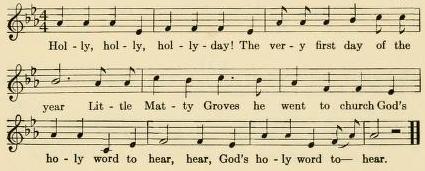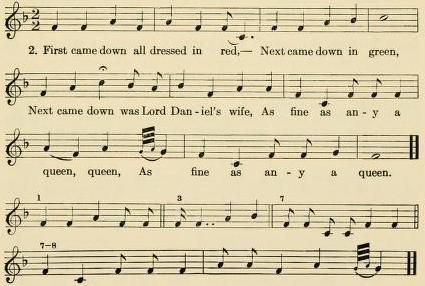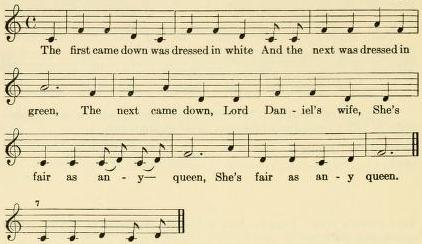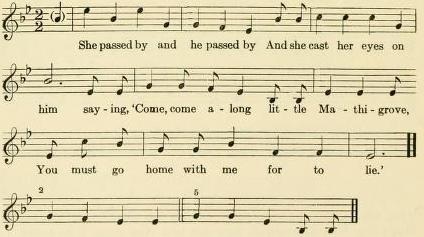OLDER BALLADS MOSTLY BRITISH
[The texts for D and E can be found in Abrams MS. Mrs. York's version is apparently based on Smiths text (Brown A). Brown F is the music for Brown E from Mrs. Church. There should be no Brown F.
26. Little Musgrave and Lady Barnard (Child 81)
For the fortunes of this ballad in America (where it has lasted much better than in the country of its origin), see the admirable discussion by Barry (BBM 150-94) ; and for its geographical range, see BSM 57-8 — adding to the references there given Vermont (NGMS 135-9), Kentucky (BTFLS in 95, TKMS 62-71), North Carolina (FSRA 25-31), Missouri (OFS I 124-6), Ohio (BSO 48-51), and Michigan (BSSM 46-9). In addition to Barry's evidences for a distinctive and early American tradition for this ballad may be mentioned certain traits common to all or most of the American texts, both north and south, and rare or absent altogether in Child's British versions. One of these is the expression "cost me deep in purse" when the lord is telling of his two swords. The only approximation to this in the Child versions is in A, from a seventeenth-century print: "Full deere they cost my purse." But in America it appears in more than a score of texts ranging from Nova Scotia and Maine to North Carolina and to Missouri, sometimes in a corrupted form that shows the locution was heard but not understood, as in Cambiaire's reading "they cost me keep in purse" (ETWVMB 53). The expression sounds rather literary than dialectal, but it is a mark of the American texts. Another item peculiar to American texts is the form of punishment meted out to the lady by her injured husband". Nowhere in American texts do we find the savagery of Child A, "He cut her paps from off her breast"; but we do find, in texts ranging again from Nova Scotia to North Carolina and to Missouri, that he "split her head in twain," sometimes in a way to show that the locution was traditional but not understood: "cut her all up into twain" (TBV E), "split her head into twine" (SharpK B). The attempt of the lady by threats or bribery to prevent the page from carrying the news of her behavior to her husband, found in Child CDEFHIJKL, does not appear in American texts. That the bugle is blown as a warning by a friend of Musgrave's, a trait that appears in three of the texts in the present collection, is not exactly diagnostic; it is found in C J L of the Child versions and may perhaps be inferred in some of the others; and it appears sporadically in American texts both north and south, e.g., in BBM Fa Fb, TBV B, SCSM A, FSRA, SharpK I J K, FSSH A B, BSM, and BSSM.
A. 'Lord Daniel's Wife.' Written down by Thomas Smith of Zionville, Watauga county, from the singing of Bennett Smith, "who first heard it sung over 50 years ago"; sent in March 1914 to C. Alphonso Smith, and later to the North Carolina collection. Stanzas 3, 7, 8 are metrically defective and stanza 18 excessive.
1 Holly, holly, holliday!
The very first day of the year
Little Mattly Groves he went to church
God's holy word to hear, hear,
God's holy word to hear.
2 The first to come down was a gay ladye,
The next to come down was a girl,
The next to come down was Lord Daniel's wife,
The fairest of them all, all, all,
The fairest of them all.
3 On Little Mattly Groves she cast her eye.
Saying, 'You must go home with me this night
For to lie, lie, lie,
You must go home with me for to lie.'
4 'I cannot go,' Little Mattly said,
'I cannot go for my life,
For I see by the ring that you wear on your finger
That you are Lord Daniel's wife, wife, wife,
That you are Lord Daniel's wife.'
5 'If I am Lord Daniel's wife.
Lord Daniel's not at home ;
He's gone away to old England
King Henry for to see, see, see.
King Henry for to see.'
6 Little Swift-foot he was standing by;
He heard the news and he ran
Till he came to the deep river side,
And he took off his shoes and he swam, swam, swam,
And he took off his shoes and he swam.
7 He swam till he came to the high dry land,
And he buckled on his shoes and he ran, ran, ran,
And he buckled on his shoes and he ran.
8 Till he came to the King's high gate;
And he pulled at the bell till it rang, rang, rang,
And he pulled at the bell till it rang.
9 'What news? What news?' Lord Daniel said,
'What news have you brought from home?
Has my wife gone to bed with a daughter,
Or has she gone to bed with a son, son, son,
Or has she gone to bed with a son?'
10 'She has neither gone to bed,' Little Swift-foot said,
'With a daughter or a son.
But has gone to bed with Little Mattly Groves,
And that is why I have come, come, come,
And that is why I have come.'
11 Lord Daniel mounted his trusty horse
And he rode till he came to his home.
He entered and found Little Mattly Groves
In bed with his wife in his room, room, room,
In bed with his wife in his room.
12 'How do you like my coverlets?
How do you like my sheets?
And how do you like my gay ladye
Who lies in your arms asleep, sleep, sleep,
Who lies in your arms asleep?'
13 'Very well I like your coverlets,
Very well I like your sheets;
Much better I like your gay ladye
Who lies in my arms asleep, sleep, sleep.
Who lies in my arms asleep.'
14 'Rise up ! Rise up!' Lord Daniel said,
'And put your clothing on.
It shall never be said in old England
That I slew an unclothed man, man, man,
That I slew an unclothed man.'
15 'If I must rise up," Little Mattly said,
'If I must fight for my life,
I see you have two broadedged swords,
And me not as much as a knife, knife, knife,
And me not as much as a knife.'
16 'It's true I have two broadedged swords,
They cost me deep in the purse.
You can have the best of them
And I will take the worst, worst, worst,
And I will take the worst.'
17 The very first lick Little Mattly struck
He wounded deep and sore;
But the very first lick Lord Daniel struck
Little Mattly fell to die floor, floor, floor,
Little Mattly fell to the floor.
18 Lord Daniel took his wife on his knee,
Saying, 'How do you like my rosy cheeks,
And how do you like my chin?
And how do you like Little Mattly Groves
Who lies before you slain, slain, slain,
Who lies before you slain?'
19 'Very well I like your rosy cheeks,
Very well I like your chin;
Much better I like Little Mattly Groves
Than you and all your kin, kin, kin,
Than you and all your kin.'
B. 'Little Mathey Grones.' From the manuscript songbook of Miss Edith Walker of Boone, Watauga county. [Although no date is given, Edith Walker made another contribution to the Brown Collection on August 8, 1940.] Here we have the warning by Mathey's friend, the dialogue between Mathey and the lady in bed, and the head-splitting at the end. Stanzas 3 and 6 seem to be the result of telescoping two stanzas or parts of stanzas. Stanza 7 I have attempted to bring into order by some additions. "Grones" is quite possibly a misreading for "Groves." Stanzas 9 and 17 are imperfect metrically, and there is confusion in the assignment of speeches in stanza 11.
1 To my hi, to my hi, to my hi holy day.
To the very first day of the year,
When Lord Arnald went down to King Henry's
The Holy Word for to hear, hear,
The Holy Word for to hear.
2 The first come by was a gay ladee,
The next come by was a gal.
The next come by Lord Arnald's wife,
She's the fairest of them all, all,
She's the fairest of them all.
3. Oh, it's 'Come, Little Mathey, come,' says she
'And go home with me tonight.'
'Oh, no, I dare not for my life;
For I know by the gold rings on your finger
That you are Lord Arnald's wife, wife,
That you are Lord Arnald's wife.'
4. 'What if I am Lord Arnald's wife?
Lord Arnald himself ain't at home.
For he's gone down to King Henry's
The Holy Word for to hear, hear,
The Holy Word for to hear.'
5. Oh, a little foot-page was a-standing by,
And he took to his heels and he run;
He run to where the bridge was apart
And he pitched to his breast and he swum, swum,
And he pitched to his breast and swum.
6. He run unto King Henry's gate,
(And he rung both loud and shrill)
And tingled (so) loud at the gate,
And none was so ready as Lord Arnald his self
To rise and let him in, in,
To rise and let him in.
7 'What news, what news, O little foot page,
What news you have for me?'
'It's Little Mathey Grones is home
[In bed] with your gay ladee, [ladee],
[In bed] with your gay ladee.'
8 'If this be a lie you tell unto me,
A new rope shall be made;
If this be the truth you tell unto me,
My daughter shall be your bride, bride,
My daughter shall be your bride.'
9 Lord Arnald he gathered
His men all in a row,
And he charged them not one word for to say
Nor nary horn for to blow, blow,
Nor nary horn for to blow.
10 But one of the men in the crowd.
Who knew Little Mathey full well.
He clapped his bugle to his mouth
And blew both loud and shrill, shrill.
And blew both loud and shrill.
11 'Lie still, Little Mathey, lie still,' says she,
'And let me listen awhile;
For I think I hear Lord Arnald's bugle
Blow both loud and clear, clear,
Blow both loud and clear.
12 'Lie down, Little Mathey, lie down,' says she,
'And keep the cold from me;
For it's nothing but my daddy's[1] little shepherd boy
A-driving the sheep from field, field,
A-driving the sheep from field.'
13 To hug and kissing they did go,
And likewise fell asleep.
And in the morning when they wake
Lord Arnald stood at their bed feet, feet.
Lord Arnald stood at their bed feet.
14 It's 'How do you like my bed,' says he,
'And how do you like my sheet.
And how do you like my gay ladee
That lies in your arms and sleeps, sleeps.
That lies in your arms and sleeps?'
15 'Mighty well do I like your bed,' says he,
'Mighty well do I like your sheet;
Much better do I like your gay ladee
That lies in my arms and sleeps, sleeps,
That lies in my arms and sleeps.'
16 'Get up. Little Mathey, get up,' says he,
'And put your clothing on.
For it never shall be said when you're dead and gone
That I slain you a naked man, man,
That I slain you a naked man.'
17 'Oh no, oh no, I dare not for my life;
For you have two broad swords
And I have nary knife, knife,
And I have nary knife.'
18 'If I have two broad swords
And you have nary knife.
The best of them I'll give to thee
And the worst of them I'll keep, keep,
And the worst of them I'll keep.'
19 The very first lick Little Mathey struck
Lord Arnald was full sore.
The very first lick Lord Arnald struck
Little Mathey couldn't fight any more, more,
Little Mathey couldn't fight any more.
20 He took his gay ladee by the hand
And set her on his knee:
'Say, tell unto me which you love best,
Little Mathey Grones or me, me,
Little Mathey Grones or me.'
21 'It's mighty well do I like your rosy cheeks,
Mighty well do I like your chin.
But very much better do I like Little Mathey Grones
Than Lord Arnald and any of his kin, kin,
Than Lord Arnald and any of his kin.'
22 He took his gay ladee by the hand
And led her to the lane;
He took his broad sword from his side
And split her head in twain, twain,
And split her head in twain.
1. Variant reading "papa's."
C. 'Lord Daniel' or 'Little Mathigrew.' Sent in by I. G. Greer of Boone, Watauga county, probably in 1913 or 1914. This text is nearer to B than to A, but differs interestingly from both in details. The manuscript is not divided into stanzas.
1 It was on one day, it was on one day.
The first day of the year,
Little Mathigrew rode down to church,
To see and to be seen.
2 The first came down was a raven's wife,[2]
The next came down was a fair;
The next came down was Lord Daniel's wife;
She was the fairest there.
3 She looked all around through every room;
She placed her eyes on him.
Says 'You must go home with me this night,
This livelong night to stay,'
4 'I can't go home with you this night,
This livelong night to stay.
For the rings that's on your fingers, love,
You are Lord Daniel's wife.'
5 'It makes no difference whose wife I am,
To you nor no other man;
Lord Daniel's not at home tonight ;
He's in some distant land.'
6 The little foot-peg was standing by;
He turned on his heels and he ran.
He ran till he came to the bridge broken down;
He fell upon his breast and swam.
7 He swam till he came to the other side;
He turned on his heels and he ran.
He ran till he came to the Cane-Castle door,
And he rattled at the bells and he rang.
8 'What news, what news, my little foot-peg,
What news have you brought unto me?'
'I've come to let you know that Little Mathigrew
Is in the bed with your fairest dee.'
9 'If this is a lie you have brought unto me.
What I suppose it to be,
I'll grease my rope from end to end
And I'll hang you to a tree.
10 'But if this is the truth you have brought unto me.
Which you suppose it to be,
I have but one daughter in this wide world,
And a married bright[3] you shall be.'
11 He gathered his men all in a row,
Says, 'Boys, now let's us go;
And nary a man in this crowd
Musn't let his bugle blow.'
12 There was a man in this same crowd
That knew Little Mathey well.
He placed his bugle to his mouth
And blew both loud and shrill.
13 I must get up, I must get up,
I must get up and go.
Lord Daniel he is coming, love,
For I heard his bugle blow.'
14 'Lie down, lie down. Little Mathigrew,
Lie down and go to sleep.
For it's nothing but my father's little boys
A-herding in their sheep.'
15 They turned into each other's arms
And fell into a sleep.
And when Little Mathigrew woke up
Lord Daniel was at his feet.
16 'Get up, get up, Little Mathigrew,
And put your clothing on.
For it never shall be said when I am dead
That I murdered a naked man.'
17 I can't get up, I can't get up,
I cannot for my life,
For you have two bran-new swords at your side
And I have nary a knife.'
18 'Very well, I have two swords to my side,
They cost me deep in purse;
You may have the best one.
And I will take the worst.'
19 Little Mathigrew struck the first lick,
And slew Lord Daniel's soul.[4]
Lord Daniel struck the very next lick,
And Little Mathey couldn't strike no more.
20 He took his fair young lady by the hand
And sat her on his knee.
Says 'Which of us do you love the best,
Little Mathigrew or me?'
21 'Very well do I like your red rosy cheeks.
Much better do I like your chin.
But I wouldn't give Mathigrew's little finger nail
For you and all your kin.'
22 He took his fair lady by the hand
And led her through the hall;
With his bran-new sword in his right hand
Lord Daniel's wife's head did fall.
23 The handle of the sword was against the wall
And the point toward his heart;
Says 'Ain't this hard to the friends all around
Lord Daniel and his wife has to part.'
Footnotes:
2. Barry (BBM 181) supposes a like locution in one of his texts to be corrupted from "arrayed in white."
3. One expects "bride"; but the line is not easily construed if that reading is substituted.
4. If this line means what it seems to mean it is clearly wrong, for Lord Daniel is by no means dead at this point. Perhaps it should read "And smote Lord Daniel sore."
D. "Lord Donald.' Secured by W. Amos Abrams, at Boone, from Mary Bost of Iredell county; just when does not appear, but some time in the thirties. It is a peculiarly disordered text. The lady tells Little Mattly Groves that
Lord Donald's by the river side,
King David for to see.
Little Mattly has more than one friend among Lord Donald's men:
There are many Little Mattly Grove's friend,
And many there his foes.
One at the very head of the row
Said 'I wish Little Mattly Groves a good will'
He put his bugle to his mouth
And blowed both loud and shrill.
The husband's sarcastic challenge to the lovers is shoved forward into the dialogue between the lovers :
'It's how do you like my feather bed,
And how do you like my sheet,
And how do you like my gaily days
That I could lie in your arms and sleep?'
'Very much do I like your feather bed.
And very much do I like your sheet.
But much better do I like your gaily days
That you could lie in my arms and sleep.'
Then they fell to hugging and kissing.
And then they fell asleep.
Lord Donald tells Little Mattly that his two swords "cost me deep in purse." At the end
He drew his sword
And in twain he split her head.
He jumped on his horse
And rode to London town,
Saying he'd slew the prettiest little woman
That ever walked the ground.
E. 'Lord Daniels.' From the collection of Mrs. Minnie Church of Heaton, Avery county, contributed in 1930. A somewhat vague text; the lady tells little Mathie Grove that
My husband he is not at home,
He's in some distant land;
the page becomes "little Pate foot" and is referred to by the pronoun "she" in stanza 4 but passes thereafter to the customary "he"; the warning bugle is heard but we are not told that it was blown by a friend of Mathie Grove's; the end introduces a new element :
He took his lady by the hand,
He led her in the hall;
He snapped a pistol in her breast,
She fell by a special ball, ball.
She fell by a special ball.
'Go dig my grave on yonders hill,
Dig it wide and deep;
Bury Little Mathie Grove in my arms.
Lord Daniels at my feet.'
----------------------------------
26. Little Musgrave and Lady Barnard (Child 81) [music]
A. 'Lord Daniel's Wife.' ms score written by Thomas Smith of Zionville, Watauga county, from the singing of Bennett Smith. Besides other similarities, the first three measures are practically identical with those of the Walker version, 26B.

For melodic relationship cf. **SharpK i 161-82. Although our tune is in 3/4 time, it is, in its basic melodic outline closely related to versions No. 23 L and N. Measure 8 of our version is identical with the same of versions A, C, E, G, I, and O.
Scale: Mode III, plagal. Tonal Center: a-flat. Structure: abcdd1 (2,2,2,2,2).
-----------------------
B. 'Little Mathey Grones.' ms score from Miss Edith Walker, of Boone, Watauga county. No date. The first three measures, as mentioned above, are almost identical with those of 26A. The first two measures are identical with the well known song 'Old MacDonald Had a Farm,' and measures 3-4 and 7-8 remind one very much of 'Yankee Doodle.' For textual variants cf. BB 52-3.


For melodic relationship cf. **SharpK I 181, No. 23 L, N, measures 1-3; OFS I 126, No. 20C, the first four measures are rhythmically identical, melodic relationship is insignificant. Scale: Mode III, plagal. Tonal Center: f. Structure: aba1bc(2,2,2 2 2) = aa1b (4.4,2).
---------------------
B(1) "Little Mathey Groves.' Sung by Mrs. James York. From previous recording of Dr. W. A. Abrams, Boone, August 8, 1940.
.jpg)
For melodic relationship cf. **SharpK i 168, No. 23E, measures 1-4, but only in a very basic way of melodic tendency. Scale: Mode H, plagal. Tonal Center: e. Structure: abab (2,222)= ab (4,4).
----------------------
C. Lord Daniel' or 'Little Mathigrew.' ms score from I. G. Greer, of Boone, Watauga county, probably in 1913 or 1914.


For melodic relationship cf. *SharpK I 182, No. 230. Our first two measures might be called a variation of the same in the Sharp version. Scale : Mode III, plagal. Tonal Center : g. Structure : aba1c (2,2,2,2) = aa1 (4,4).
---------------------
F. 'Lord Daniel's Wife.' Sung by Mrs. J. Church. Recorded at Heaton, Avery county, July 30, 1939.

For melodic relationship cf. **SharpK i 164, No. 23C. Scale: Pentachordal, plagal. Tonal Center: f. Structure: abcdd1 (2,2,2,2,2).
------------------
G. 'Little Musgrove and Lady Barnard.' Sung by Mrs. Nora Hicks. Recorded at Mast's Gap, Watauga county, in September 1940. Our stanza is the second.

For melodic relationship cf. **SharpK i i68, No. 23 F and K, measures 1-4; BSM 58; *SharpK i 172, No. 23H, only the beginning; OFS i 126, No. 20C; and BBM 177.
Scale: Tetratonic (2,4), plagal. Tonal Center: f. Structure: abcdd1 (2,2,2,2,2).
H. 'Little Mathey Groves.' Sung by Mrs. Nancy Prather. Recorded at Milam, Ashe county, August 5, 1939.
The recording is so poor that not all the words are recoverable. The text is garbled, for the first two lines evidently belong to the first, the next two to the second stanza (see below). The words with the tune correspond to stanza 3.

Scale: Mode III, plagal. Tonal Center: e-flat. Structure: abed (2,2,2,2). Measure 5 is derived from measure 2.
1 .... boy and the .... girl
The very first day of the year.
2 The first came down was a kingly bride,
And the other was a gaily girl.